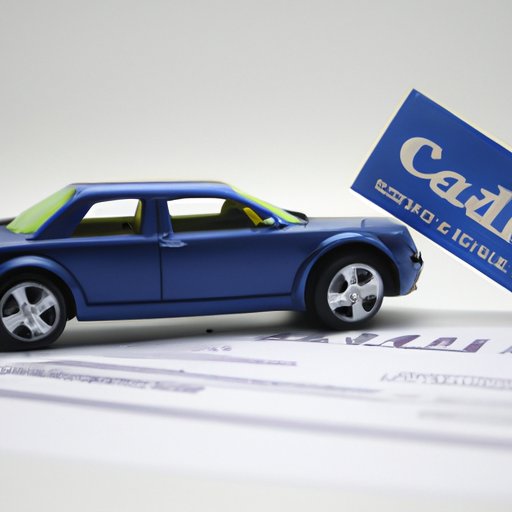
Introduction
When it comes to buying a car, it’s important to determine a budget that suits your financial situation and needs. Failing to set a realistic budget can lead to financial stress and even debt. In this article, we’ll explore the top factors to consider when determining your car budget, how to set a realistic budget, the pros and cons of financing versus paying cash, the hidden costs of car ownership, the impact of credit score on your car buying budget, the option of buying a used car, and quick tips for negotiating a lower price on your next car purchase.
The Top 5 Factors to Consider When Determining Your Car Budget
There are several factors to consider when determining your car budget:
1. Income
Your income level plays a significant role in how much you can afford to spend on a car. As a general rule of thumb, your car payment (including insurance and gas) shouldn’t exceed 20% of your monthly income. For example, if you earn $4,000 per month, your car payment should not be more than $800 per month.
2. Monthly Expenses
Consider all of your monthly expenses, such as rent/mortgage, utility bills, and other debts (credit cards, student loans). Determine how much you can comfortably allocate towards your car budget without sacrificing other expenses.
3. Down Payment
If you plan on financing your car, a larger down payment can lower your monthly payments and reduce the amount of interest paid over time.
4. Trade-in Value
If you plan on trading in your current car, research its current market value to determine how much you can use towards your next car purchase.
5. Cost of Insurance
The cost of auto insurance can vary widely depending on location, age, driving history, and type of car. Be sure to obtain insurance quotes before making a final decision on your car purchase.

How to Set a Realistic Budget for Buying a Car
Here are some steps you should take to ensure you set a realistic budget for buying a car:
1. Establishing a Price Range
Use online calculators to determine how much car you can afford based on your income and expenses. Once you have a basic range, consider all of the other ongoing costs of owning a car.
2. Considering Ongoing Costs
When budgeting for a car, be sure to factor in the cost of gas, maintenance, repairs, and insurance. These can add up quickly and should be considered when setting a budget.
3. Considering the Purpose of the Car
Consider whether the car will be used for commuting, transporting family, travel, or other specific purposes. This can help determine whether a smaller or larger car is necessary and if certain features (such as all-wheel drive or towing capacity) are needed.
4. Researching Prices
Research the price range of the car(s) you’re considering and compare prices at different dealerships. Be sure to calculate the total cost, including taxes, fees, and any additional warranties.
The Pros and Cons of Financing vs. Paying Cash for a Car
There are advantages and disadvantages to both financing and paying cash for a car:
Advantages of Financing
- Build credit score
- Ability to buy a better car
Disadvantages of Financing
- Interest fees
- Longer payment period
Advantages of Paying Cash
- Avoid interest fees
- Own the car outright
Disadvantages of Paying Cash
- Less money available for other expenses
The Hidden Costs of Car Ownership You Need to Consider
When buying a car, there are additional costs you need to consider:
1. Insurance Costs
The cost of auto insurance can vary widely depending on location, age, driving history, and type of car. Be sure to obtain insurance quotes before making a final decision on your car purchase.
2. Maintenance and Repair Costs
All cars will require maintenance and repairs over time. This can include oil changes, tire rotations, and more significant repairs such as engine work or transmission replacements.
3. Fuel Costs
Fuel costs are a significant ongoing expense for car owners, particularly if you’re driving long distances or using a larger vehicle.
4. Depreciation Costs
Depreciation is the reduction in a car’s value over time. All cars will depreciate, but some makes and models will hold their value better than others.
How Your Credit Score Affects Your Car Buying Budget
Your credit score is an important factor in determining your interest rate and the amount you can borrow when financing a car.
Explanation of the Importance of Credit Score
A good credit score shows lenders that you’re responsible with credit and more likely to make your car payments on time.
How Credit Score Affects Loan Approval and Interest Rates
A higher credit score can increase your chances of loan approval and lower your interest rate. A lower credit score can result in higher interest fees and a lower loan amount.
Tips for Improving Credit Score
- Make on-time payments for credit cards and other debts
- Keep credit card balances low
- Monitor your credit report for errors
Why You Should Consider Buying a Used Car to Save Money
Buying a used car can be a more affordable option than buying a new car.
Explanation of How Used Cars Can Be a More Affordable Option
Used cars have already depreciated, so you can often buy a car with low mileage and some factory warranty remaining for less than the cost of a new car.
Benefits of Buying Used Cars
- Lower purchase price
- Lower insurance costs
- Lower depreciation costs
Precautions to Take When Buying Used Cars
- Obtain a vehicle history report
- Have the car inspected by a mechanic
- Beware of scams and unethical sellers
Tips for Negotiating a Lower Price on Your Next Car Purchase
Negotiating the price of a car can save you thousands of dollars. Here are some tips to help you negotiate:
Researching the Car’s Value
Research the market value of the car(s) you’re interested in and use this information to negotiate the price down.
Being Prepared to Negotiate
Be confident and prepared to negotiate. Know your budget and what you can afford, and be prepared to walk away if the price is not right.
Recognizing the Seller’s Negotiating Tactics
Sellers will often use tactics such as “limited-time offers” or “this price is only available today” to pressure buyers into making a decision. Be aware of these tactics and stick to your budget.
Conclusion
When buying a car, it’s essential to have a budget in mind and consider all of the factors that will impact your ongoing costs of ownership. Whether financing or paying cash, buying new or used, or negotiating the price down, there are numerous ways to save money and make sure you end up with a car that meets your needs and your wallet.
Key Takeaways:
- Don’t exceed 20% of your monthly income on your car payment.
- Factor in ongoing costs such as insurance, fuel, and maintenance.
- Credit score affects your loan amount and interest rates.
- Buying a used car can save you thousands of dollars.
- Be prepared to negotiate and aware of the seller’s tactics.




